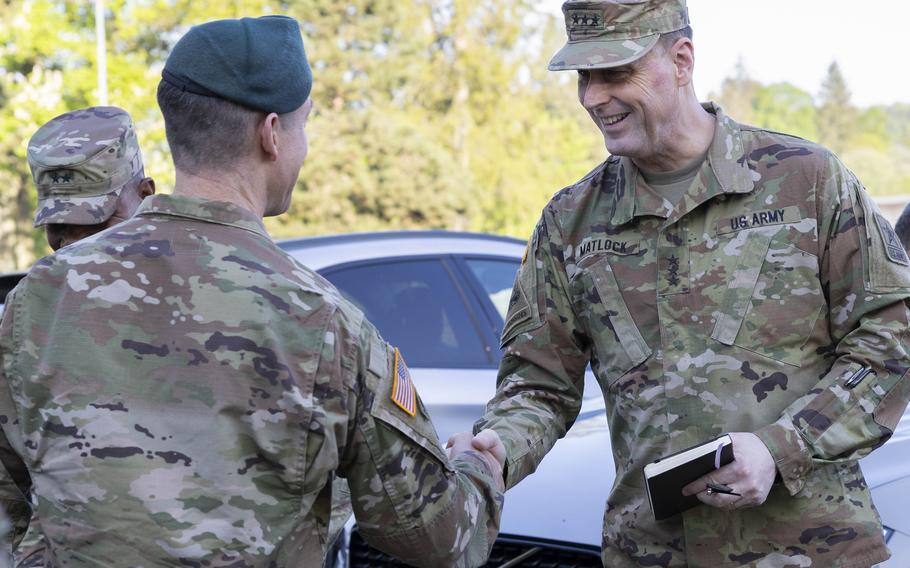
Army leaders on Thursday, Sept. 19, 2024, repeatedly declined to tell House lawmakers whether anyone at Fort Liberty, N.C., was punished for a training presentation that labeled anti-abortion and animal rights groups as potential terrorists. (Corey Dickstein/Stars and Stripes)
Top Army leaders on Thursday repeatedly declined to say whether anyone was punished for inaccurate training at Fort Liberty, N.C., that labeled anti-abortion groups and other nonprofits as potential terrorists.
House lawmakers from both parties fumed as Lt. Gen. Patrick Matlock, the Army’s director of operations, plans and training, told them that service policy prevented him from disclosing any punishments rendered to individuals involved in the botched training. The training in question was presented to soldiers who guard entry gates at Fort Liberty by the installation’s civilian-led emergency services office. It had been in use since at least 2017 until they were made public this year via social media posts, according to an Army investigation.
“The individual who created the training has received corrective training, has been retrained as a trainer and continues to perform his job,” Matlock told the House Armed Services Committee’s military personnel subpanel. “I’m not going to talk about specific accountability actions, because those actions reside … with the chain of command, and it’s our policy not to discuss those.”
His response brought widespread condemnation from the subpanel’s members. Rep. Jim Banks, R-Ind., the subcommittee’s chairman, told Matlock that not disclosing any punishment could harm the Army’s image with the American public, calling it a “dangerous and bad pattern.”
“General, I respect you. I respect the uniform that you wear, but your inability to discuss accountability with us today, I think, greatly undermines your position, your authority, your leadership,” Banks said at the conclusion of the hearing. “I think the reason that you can’t answer the question is because you know, and we know, that no one has ever been held accountable for this training that started in 2017 and occurred until a few months ago.”
An Army investigation of the incident at Fort Liberty found a base employee had inaccurately labeled several organizations including anti-abortion groups National Right to Life and Operation Rescue and others such as Earth First!, the Earth Liberation Front, the Animal Liberation Front and People for the Ethical Treatment of Animals, or PETA, as terrorist organizations, said Agnes Schaefer, the Army’s assistant secretary for manpower and reserve affairs. The PowerPoint training presentation was developed locally at Fort Liberty and not approved by the Army or top officials at the installation, she said.
The investigation, launched in July shortly after the training slides appeared online, found the “junior employee” who created it did not intend to break Army policy or “further a personal viewpoint” via the training, Schaefer said. Instead, the individual used “open-source research” that “inaccurately implied that the organizations on the slide were potential security threats.”

Army Lt. Gen. Patrick Matlock, right, testified Thursday, Sept. 19, 2024, before the House Armed Services Committee’s military personnel subpanel about training at Fort Liberty, N.C., that labeled anti-abortion groups and other nonprofits as potential terrorists. (U.S. Army photo)
Neither Schaefer nor Matlock could provide a clear answer on how the training was allowed to go on for years unnoticed. Banks said as many as 10,000 soldiers completed the training.
They promised a service-wide review of all training material from Army headquarters to all its locations to ensure materials that soldiers were being taught aligned with service policies. Matlock said he was confident no other similar training failures now exist in the service.
“Standardization is a cornerstone of our training enterprise and ensures that isolated incidents such as this remain isolated,” the general said. “… I’m confident that in most cases, the review is already completed, and thus far, there’s been no issues identified with any other training materials” across the Army.
The incident comes as Republicans have repeatedly criticized Pentagon and Army efforts to stamp out extremist activity as overly broad and not in keeping with the American tradition of freedom of expression. Army policy, updated in June, bans soldiers from participating in or supporting extremist or gang-related activities or espousing extremist views in or out of uniform. Republicans have worried the measures bar troops from supporting traditionally conservative causes. Many of them came in response to the Jan. 6, 2021, attack on the U.S. Capitol by supporters of former President Donald Trump.
GOP lawmakers said incidents such as the use of the incorrect training aids that labeled the anti-abortion groups as terrorists only further their concerns.
Army and Pentagon officials deny their policies have any political agenda. Schaefer said Thursday that the policies ensure a soldier’s “right of expression” is preserved under the U.S. Constitution, so long as it is “consistent with good order and discipline and national security.”
Schaefer defended the extremism policies, though she noted the Fort Liberty incident was unrelated to them and rooted in training for countering terrorism. The Army, she said, was at fault for allowing the training to continue for years, however, she also said surveys given to soldiers who had received the training at Fort Liberty showed they were not influenced by the incorrect slides.
The Army officials said the soldiers who received the training over the years were not individually informed the nonprofit groups in the presentation were not terrorist organizations.
“This is embarrassing, and it makes me wonder, what other mistakes is the United States Army making, maybe even in a larger way,” said Banks, an officer in the Navy Reserve.
Democrats joined Banks and a handful of other Republicans in calling for more transparency about the incident — especially if someone was punished. Criminal punishments of soldiers are made public, though non-criminal punishments of soldiers and Defense Department civilian employees are not typically made public for privacy reasons, according to Pentagon policy.
At times, Pentagon officials have acknowledged individuals involved in incidents have face punishment without providing names or specifics. Matlock on Thursday repeatedly declined to provide any information about punishments in the Fort Liberty incident.
Rep. Steven Horsford, D-Nev., told Matlock failing to disclose such punishment makes it more difficult to address “real extremism problems” in the military.
“We’re not getting to the root. We’re not getting the answers,” said Rep. Terri Sewell, D-Ala. “We need to really evaluate extremist activities, and I think that until we get that, it’s hard for us to continue to proceed, and it definitely does undermine service members’ confidence in their ability to actually get incidents like this resolved.”
Rep. Cory Mills, R-Fla., a former Army noncommissioned officer, argued Matlock’s unwillingness to discuss any punishments made the hearing a waste of time.
“What’s the point in having these hearings if we don’t have someone who’s willing to testify to give us the answers,” Mills said to the general. “This is completely pointless … given the fact that you can’t even come before Congress to ensure that we have accountability and oversight that is a key and critical thing. My young corporals and [sergeants] knew that.”